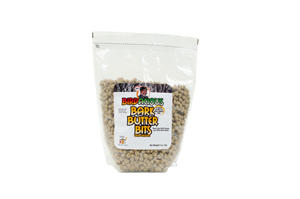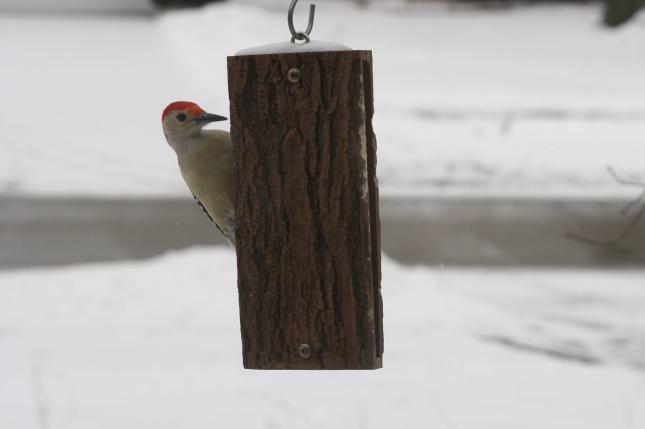
Suet is a type of animal fat consumed by many varieties of bird, including but not limited to: woodpeckers, chickadees, titmice, nuthatches, wrens, thrushes, grosbeaks, and orioles. Suet is available at a lot of stores. However, not all suet is created equal, and finding the best for your birds can be tricky if you just grab the least expensive option on the shelf. We use the highest quality food grade tallow/beef suet to ensure quality and freshness. Our suet blends are formulated with increased amounts of fat and protein to provide birds with a nutritious, high-energy food. They also include ingredients that are proven to be more attractive to birds - peanuts, tree nuts, fruit and mealworms. We never add undesirable fillers or unnecessary vitamins or minerals.
Stop by the store to pick up some suet; your birds will know the difference.!
No bird food attracts more species of birds than our spreadable suet, called Jim's Birdacious® Bark Butter® (scroll down for a comprehensive list of bird species who eat it). Created by Jim Carpenter, founder of Wild Birds Unlimited, Bark Butter is a spreadable suet that can be easily smeared on tree bark or a Bark Butter Feeder to attract birds such as chickadees, nuthatches, catbirds, cardinals, mockingbirds, wrens, woodpeckers, towhees, Brown Creepers, grosbeaks, robins and more. This exclusive food option is made from suet, peanut butter and corn for a high energy treat your birds will love.

We also carry Jim's Birdacious® Bark Butter® Bits, which are bite-sized nuggets are made of rendered beef suet, peanut oil, roasted peanuts, corn, oats and calcium carbonate and allow you to easily offer Bark Butter to attract a variety of birds, including many that do not normally visit feeders. They are particularly popular among birds during the nesting season when a Bark Butter® Bit can be carried by parent birds to feed to their young. The nutrients in these products help with feather production, as well as with second clutches of eggs which are often laid around this time.

Bark butter products can also be used in conjunction with feeders such as the one pictured below. Simply open the door, spread the Bark Butter inside, and you're good to go! This feeder is perfect for woodpeckers whose long tongues reach inside, but also excludes Starlings whose tongues cannot reach. Attract native birds with a Bark Butter station of your own.

Who Is Eating Bark Butter?
The Bark Butter Bird List
Originally, Jim Carpenter created Bark Butter to attract Brown Creepers. However, through the years many more species of birds have been seen eating it; 138 so far and counting. Here is the list of birds across North America that have been reported eating Jim's Birdacious Bark Butter.
Ducks
Muscovy Duck
Mallard
Quail
California Quail
Gambel’s Quail
Northern Bobwhite
Pheasant & Turkey
Ring-necked Pheasant
Wild Turkey
Pigeons & Doves
Band-tailed Pigeon
Eurasian Collard-Dove
White-winged Dove
Mourning Dove
Hummingbirds
Ruby-throated Hummingbird
Anna’s Hummingbird
Woodpeckers & Sapsuckers
Lewis’s Woodpecker
Red-headed Woodpecker
Acorn Woodpecker
Gila Woodpecker
Golden-fronted Woodpecker
Red-bellied Woodpecker
Yellow-bellied Sapsucker
Ladder-backed Woodpecker
Nuttall’s Woodpecker
Downy Woodpecker
Hairy Woodpecker
Arizona Woodpecker
White-headed Woodpecker
Northern Flicker
Pileated Woodpecker
Parrots (feral)
Yellow-chevroned Parakeet
Phoebes
Black Phoebe
Eastern Phoebe
Jays
Gray Jay
Pinyon Jay
Steller’s Jay
Blue Jay
Western Scrub-Jay
Mexican Jay
Nutcracker
Clark's Nutcracker
Magpies
Black-billed Magpie
Crows & Ravens
American Crow
Northwestern Crow
Fish Crow
Common Raven
Chickadees
Carolina Chickadee
Black-capped Chickadee
Mountain Chickadee
Mexican Chickadee
Chestnut-backed Chickadee
Titmice
Bridled Titmouse
Oak Titmouse
Tufted Titmouse
Black-crested Titmouse
Verdin & Bushtits
Verdin
Bushtit
Nuthatches
Red-breasted Nuthatch
White-breasted Nuthatch
Pygmy Nuthatch
Brown-headed Nuthatch
Creeper
Brown Creeper
Wren
Cactus Wren
Carolina Wren
Bewick's Wren
House Wren
Kinglets
Golden-crowned Kinglet
Ruby-crowned Kinglet
Wrentits
Wrentit
Bluebirds
Eastern Bluebird
Western Bluebird
Thrushes
Veery
Gray-cheeked Thrush
Swainson’s Thrush
Hermit Thrush
Wood Thrush
American Robin
Varied Thrush
Catbirds, Mockingbirds, Thrashers
Gray Catbird
Northern Mockingbird
Brown Thrasher
Curve-billed Thrasher
Crissal Thrasher
Waxwings
Cedar Waxwing
Warblers
Ovenbird
Prothonotary Warbler
Orange-crowned Warbler
Nashville Warbler
Common Yellowthroat
Northern Parula
Magnolia Warbler
Yellow Warbler
Black-throated Blue
Yellow-rumped Warbler
Yellow-throated Warbler
Townsend's Warbler
Hermit Warbler
Pine Warbler
Towhees
Spotted Towhee
Canyon Towhee
California Towhee
Sparrows
Rufous-crowned Sparrow
American Tree Sparrow
Chipping Sparrow
Black-throated Sparrow
Fox Sparrow
Song Sparrow
Lincoln’s Sparrow
Swamp Sparrow
White-throated Sparrow
White-crowned Sparrow
Golden-crowned Sparrow
House Sparrow
Eurasian Tree Sparrow
Juncos
Dark-eyed Junco
Tanagers
Summer Tanager
Scarlet Tanager
Western Tanager
Cardinals & Pyrrhuloxia
Northern Cardinal
Pyrrhuloxia
Grosbeaks
Rose-breasted Grosbeak
Black-headed Grosbeak
Buntings
Indigo Bunting
Painted Bunting
Blackbirds
European Starling
Red-winged Blackbird
Rusty Blackbird
Brewer’s Blackbird
Common Grackle
Boat-tailed Grackle
Brown-headed Cowbird
Orioles
Hooded Oriole
Bullock’s Oriole
Audubon’s Oriole
Baltimore Oriole
Scott's Oriole
Finches, Redpolls, Siskin
Purple Finch
House Finch
Common Redpoll
Pine Siskin
American Goldfinch

